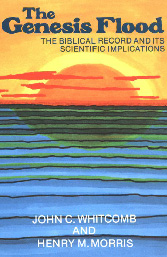Related Research Articles

Creationism is the religious belief that nature, and aspects such as the universe, Earth, life, and humans, originated with supernatural acts of divine creation. In its broadest sense, creationism includes a continuum of religious views, which vary in their acceptance or rejection of scientific explanations such as evolution that describe the origin and development of natural phenomena.

Creation science or scientific creationism is a pseudoscientific form of Young Earth creationism which claims to offer scientific arguments for certain literalist and inerrantist interpretations of the Bible. It is often presented without overt faith-based language, but instead relies on reinterpreting scientific results to argue that various myths in the Book of Genesis and other select biblical passages are scientifically valid. The most commonly advanced ideas of creation science include special creation based on the Genesis creation narrative and flood geology based on the Genesis flood narrative. Creationists also claim they can disprove or reexplain a variety of scientific facts, theories and paradigms of geology, cosmology, biological evolution, archaeology, history, and linguistics using creation science. Creation science was foundational to intelligent design.

Kent E. Hovind is an American Christian fundamentalist evangelist and tax protester. He is a controversial figure in the Young Earth creationist movement whose ministry focuses on denial of scientific theories in the fields of biology, geophysics, and cosmology in favor of a literalist interpretation of the Genesis creation narrative found in the Bible. Hovind's views, which combine elements of creation science and conspiracy theory, are dismissed by the scientific community as fringe theory and pseudo-scholarship. He is also controversial within the Young Earth Creationist movement; Answers in Genesis openly criticized him for continued use of discredited arguments abandoned by others in the movement.

Kenneth Alfred Ham is an Australian Christian fundamentalist, young Earth creationist, apologist and former science teacher, living in the United States. He is the founder, CEO, and former president of Answers in Genesis (AiG), a Christian apologetics organisation that operates the Creation Museum and the Ark Encounter.

Young Earth creationism (YEC) is a form of creationism which holds as a central tenet that the Earth and its lifeforms were created by supernatural acts of the Abrahamic God between about 6,000 and 10,000 years ago. In its most widespread version, YEC is based on the religious belief in the inerrancy of certain literal interpretations of the Book of Genesis. Its primary adherents are Christians and Jews who believe that God created the Earth in six literal days. This is in contrast with old Earth creationism (OEC), which holds literal interpretations of Genesis that are compatible with the scientifically determined ages of the Earth and universe. It is also in contrast to theistic evolution, which posits that the scientific principles of evolution, the Big Bang, abiogenesis, solar nebular theory, age of the universe, and age of Earth are compatible with a metaphorical interpretation of the Genesis creation account.

Flood geology is a pseudoscientific attempt to interpret and reconcile geological features of the Earth in accordance with a literal belief in the Genesis flood narrative, the flood myth in the Hebrew Bible. In the early 19th century, diluvial geologists hypothesized that specific surface features provided evidence of a worldwide flood which had followed earlier geological eras; after further investigation they agreed that these features resulted from local floods or from glaciers. In the 20th century, young-Earth creationists revived flood geology as an overarching concept in their opposition to evolution, assuming a recent six-day Creation and cataclysmic geological changes during the biblical flood, and incorporating creationist explanations of the sequences of rock strata.

Answers in Genesis (AiG) is an American fundamentalist Christian apologetics parachurch organization. It advocates Young Earth creationism on the basis of its literal, historical-grammatical interpretation of the Book of Genesis and the Bible as a whole. Out of belief in biblical inerrancy, it rejects the results of scientific investigations that contradict their view of the Genesis creation narrative and instead supports pseudoscientific creation science. The organization sees evolution as incompatible with the Bible and believes anything other than the young Earth view is a compromise on the principle of biblical inerrancy.

Recurring cultural, political, and theological rejection of evolution by religious groups exists regarding the origins of the Earth, of humanity, and of other life. In accordance with creationism, species were once widely believed to be fixed products of divine creation, but since the mid-19th century, evolution by natural selection has been established by the scientific community as an empirical scientific fact.

The history of creationism relates to the history of thought based on the premise that the natural universe had a beginning, and came into being supernaturally. The term creationism in its broad sense covers a wide range of views and interpretations, and was not in common use before the late 19th century. Throughout recorded history, many people have viewed the universe as a created entity. Many ancient historical accounts from around the world refer to or imply a creation of the earth and universe. Although specific historical understandings of creationism have used varying degrees of empirical, spiritual and/or philosophical investigations, they are all based on the view that the universe was created. The Genesis creation narrative has provided a basic framework for Jewish and Christian epistemological understandings of how the universe came into being – through the divine intervention of the god, Yahweh. Historically, literal interpretations of this narrative were more dominant than allegorical ones.

The Institute for Creation Research (ICR) is a creationist apologetics institute in Dallas, Texas, that specializes in media promotion of pseudoscientific creation science and interpretation of the Genesis creation narrative as a historical event. The ICR adopts the Bible as an inerrant and literal documentary of scientific and historical fact as well as religious and moral truths, and espouses a Young Earth creationist worldview. It rejects evolutionary biology, which it views as a corrupting moral and social influence and threat to religious belief. The ICR was formed by Henry M. Morris in 1972 following an organizational split with the Creation Science Research Center (CSRC).

The Creation Research Society (CRS) is a Christian fundamentalist group that requires of its members belief that the Bible is historically and scientifically true in the original autographs, belief that "original created kinds" of all living things were created during the Creation week described in Genesis, and belief in flood geology.

The Genesis Flood: The Biblical Record and its Scientific Implications is a 1961 book by young Earth creationists John C. Whitcomb and Henry M. Morris that, according to Ronald Numbers, elevated young Earth creationism "to a position of fundamentalist orthodoxy."

The Creation Museum, located in Petersburg, Kentucky, United States, is a museum that promotes the pseudoscientific young Earth creationist (YEC) explanation of the origin of the universe and life on Earth based on a literal interpretation of the Genesis creation narrative of the Bible. It is operated by the Christian creation apologetics organization Answers in Genesis (AiG).

Henry Madison Morris was an American young Earth creationist, Christian apologist and engineer. He was one of the founders of the Creation Research Society and the Institute for Creation Research. He is considered by many to be "the father of modern creation science". He coauthored The Genesis Flood with John C. Whitcomb in 1961.
Walter T. Brown is a young Earth creationist, who is the director of his own ministry called the Center for Scientific Creation. The Skeptic's Dictionary considers him to be one of the leaders of the creation science movement. He proposes a specific version of flood geology called the Hydroplate Theory. He is a retired army officer with a degree in mechanical engineering.
Paul A. Nelson is an American philosopher, noted for his advocacy of the pseudosciences of young earth creationism and intelligent design.
David Russell Humphreys is an American physicist who advocates for young Earth creationism. He holds a PhD in physics and has proposed a theory for the origin of the universe which allegedly resolves the distant starlight problem that exists in young Earth creationism.

The International Conference on Creationism (ICC) is a conference in support of young earth creationism, sponsored by the Creation Science Fellowship (CSF). The first conference occurred in 1986 at Duquesne University in Pittsburgh. Subsequent conferences have been held in 1990, 1994, 1998, 2003, 2008, 2013 and 2018.

The debate between Bill Nye and Ken Ham on the question "Is Creation A Viable Model of Origins?" was held February 4, 2014, at the Creation Museum in Petersburg, Kentucky.

Is Genesis History? is a 2017 American Christian film by Thomas Purifoy Jr. that promotes the pseudoscientific notion of Young Earth creationism, a form of creation science built on beliefs that contradict established scientific facts regarding the origin of the Universe, the age of the Earth and universe, the origin of the Solar System, and the origin and evolution of life. The film suggests the Earth was created in six days of 24-hours each in opposition to day-age creationism, and also advocates the Genesis biblical narratives of Adam and Eve, the fall, the global flood, and the tower of Babel. It grossed $2.6 million in theatres and $3.3 million in video sales.
References
- ↑ Babinski, Edward T. (2003). Leaving the Fold: Testimonies of Former Fundamentalists. Prometheus Books. p. 242.
- ↑ "Henke Spends Summer at NDSU" (PDF). Chem-News. North Dakota State University. 1996. Retrieved 10 February 2014.
- ↑ "Kevin R. Henke". University of Kentucky. Archived from the original on 17 April 2004. Retrieved 10 February 2014.
- ↑ "ECT Staff". Environmental Coal Technologies. University of Kentucky. Retrieved 10 February 2014.
- ↑ "The C-Files: D. Russell Humphreys Evidence for a Young World : NOT!". New Mexicans for Science and Reason. Retrieved 10 February 2014.
- ↑ Henke, Kevin R. (2005–2010). "Dr. Humphreys' Young-Earth Helium Diffusion "Dates": Numerous Fallacies Based on Bad Assumptions and Questionable Data". TalkOrigins Archive . Retrieved 10 February 2014.
- ↑ Young, Matt (2009). Why Evolution Works (and Creationism Fails). Rutgers University Press. p. 162.
- ↑ "Dr Kevin R. Henke exposes John Woodmorappe's fraudulent attacks on radiometric dating and reveals other creationist misrepresentations". No Answers in Genesis . Retrieved 10 February 2014.
- ↑ Kolosick, Jama. "Kent Hovind's "$250,000 Award to Prove Evolution!"". No Answers in Genesis . Retrieved 10 February 2014.
- ↑ Isaak, Mark (2005). The Counter-Creationism Handbook. University of California Press. p. 30.